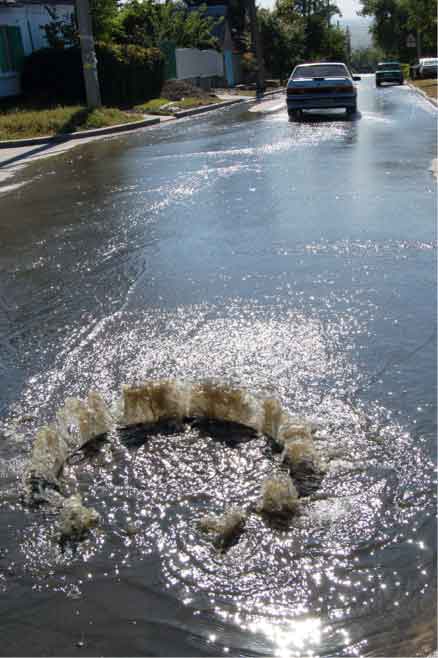Findings Presented to California’s Leading Environmental Agency Show Citizens May Be at Risk Due to Slow Investment in Innovative Technologies That Accurately Identify Bad Sewers
Sacramento, Calif. – (BUSINESS WIRE) – Sanitary Sewer Overflows (SSOs) being experienced by California cities and counties may be due to reliance on older visual-based technologies and faulty inspections by city crews and independent contractors.
Those were the findings recently presented by Sacramento-based Electro Scan Inc. to the California Environmental Protection Agency (CalEPA), State Water Resources Control Board, Office of Enforcement as part of their ongoing technical forum with outside consultants & vendors to support state & regional inspectors.
As a result, the Office of Enforcement plans on encouraging Regional Water Boards to see Electro Scanning Inspection at various upcoming project and demonstration locations throughout California.
“California’s record rainfall has put a spotlight on sewer agencies that have not made the necessary investment in new technologies needed to combat SSOs,” states Chuck Hansen, former Chair, ASTM’s Inspection and Renewal of Water and Wastewater Infrastructure Committee and Chairman, Electro Scan Inc.
“Traditionally, cities have relied on Closed-Circuit Television (CCTV) cameras – a visual-based inspection technique – to identify and catalog cracks, defective joints, and poorly connected service connections,” states Hansen, an expert in pipe condition assessment.

“But, the inability to differentiate superficial cracks from cracks that go through a pipe wall, have frustrated efforts to accurately prioritize critical pipes and certify repairs, contributing to SSOs and flooding,” states Hansen.
California SSOs are tracked statewide by an interactive map maintained by the CalEPA State Water Resource Control Board.
Studies conducted by Electro Scan included work at over sixty (60) California sewer agencies where CCTV inspection results were compared to an innovative machine-intelligent technology that accurately locates and measures defects.
Highlighted findings presented to the State Water Board’s Office of Enforcement, included:
- One study that found CCTV inspections had missed eighty-eight percent (88%) of all sewer defects, including several CCTV reports on the same pipe that showed materially different assessments, completed by the same person working for the same company, just months apart.
- Several agencies with major defects in recently repaired sewers – leaking more after repair, than before repair.
- Major damage in a newly lined pipe caused by a Contractor’s acceptance inspection; however, its final report showed ‘Zero Defects.’
- Two connected pipes that showed the newly relined pipe leaking more than the existing 50-year old pipe; both certified by CCTV inspection.
- A Northern California agency showing ‘Zero Defects’ on a sewer located in an area prone to flooding. Yet, on re-inspection, the pipe was more than half-full of water – on a clear day, mid-week, and in mid-afternoon – showing major leaks at every joint, undetected by CCTV inspection.
- A re-inspected sewer with an 11-million-gallon water main break; missed by two previous CCTV inspections conducted in 2011 and 2014. One survey had been conducted by an independent contractor, while another was completed by city staff, respectively.
Referred by the USEPA as Focused Electrode Leak Location (FELL) inspection, the new inspection standard is being adopted by leading sewer utilities to provide an unbiased way to find sources of infiltration and to certify repairs.
Using the new technology, no operator judgment or third-party data interpretation is required, with each defect provided with an estimated defect flow in gallons per minute.
In December 2015, new guidelines were published for Inspecting and Testing Collection Systems, Seventh Edition, Volume 1, OPERATIONS AND MAINTENANCE OF WASTEWATER COLLECTION SYSTEMS, ISBN 978-1-59371-066-8, recommending Electro Scanning Inspection, in place of CCTV inspection, to assess all pre- and post-repair, rehabilitation, and relining projects.
In the first twelve months of the new inspection standard, Electro Scan found defects in 69% of Cured-In-Place Pipe (CIPP) – a leading alternative to dig and replace pipe rehabilitation – traditionally inspected by visual inspection.
Overall, 21% of CIPP surveyed in 2016 using new testing standards had defect flows of 20 gallons or more, after rehabilitation.
“CCTV was the best we had for a long time, but now there is a better tool to certify point repairs, service reconnections, and trenchless rehabilitation,” states Hansen.
Since December 2016, the San Francisco Public Utilities Commission (SFPUC) and the City of San Francisco Department of Public Works have issued public bids worth over $23 million requiring FELL as its new acceptance and certification standard to ensure delivery of leak-free rehabilitation projects.
The next generation technology uses a high frequency, low voltage, focused electric current to evaluate 360-degrees of a pipe wall to find and measure openings that provide a clear path for water to enter or exit a pipe through defects.
Tested by several independent studies funded by the US EPA, the new technology is compliant with ASTM F2550-13 Standard Practice for Locating Leaks in Sewer Pipes By Measuring the Variation of Electric Current Flow Through the Pipe Wall.
In addition to numerous benefits over CCTV Inspection, Electro Scan products also show superior results in comparison to acoustic sensors, electro-magnetic, ground penetrating radar, helium tracers, laser profiling, sonar, and zoom cameras, for leak detection.
Equipment to evaluate sewers ranging from 3 to 30 inches in pipe diameter may be purchased directly from the Company and added to a variety of existing CCTV trucks or vans.
Services are offered worldwide from the Company or an Authorized Partner.
Prior to founding Electro Scan Inc., Hansen was founder and former Chairman of Hansen Information Technologies. Founded in 1983, Hansen was a leading provider of asset management solutions for water and sewer utilities, and developed the State of California’s Department of Transportation (Caltrans) work management system.
About Electro Scan
Founded in 2011, the Company develops and markets machine-intelligent pipe condition assessment products and services to evaluate and certify sewer, water, and gas pipelines.
Contact
Carissa Boudwin, Tel: +1 916 779 0660, Email: info@electroscan.com

